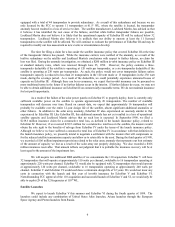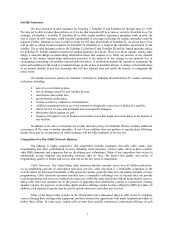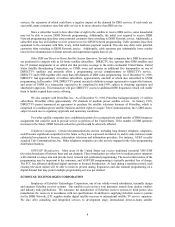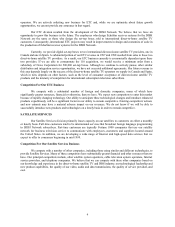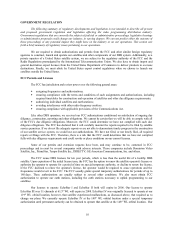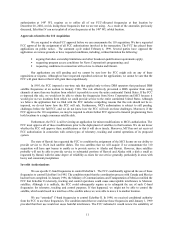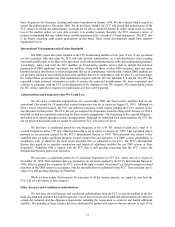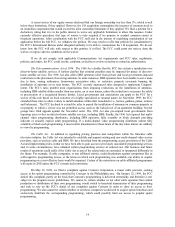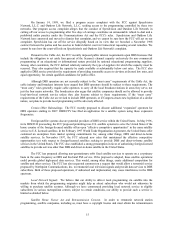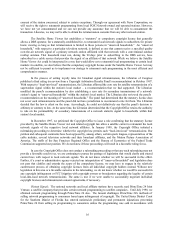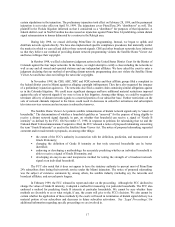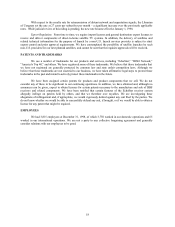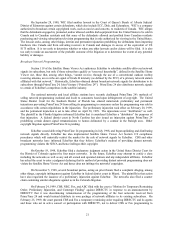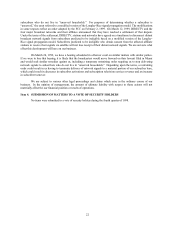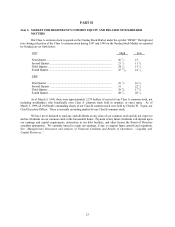Dish Network 1998 Annual Report Download - page 18
Download and view the complete annual report
Please find page 18 of the 1998 Dish Network annual report below. You can navigate through the pages in the report by either clicking on the pages listed below, or by using the keyword search tool below to find specific information within the annual report.16
consent of the station concerned, subject to certain exceptions. Through our agreement with News Corporation, we
will receive the right to retransmit programming from local FOX Network-owned and operated stations. However,
we have not yet consummated and we can not provide any assurance that we will be able to consummate the
transaction. Likewise, we may not be able to obtain the retransmission consents from any other network station.
The Satellite Home Viewer Act establishes a “statutory” or compulsory copyright license that generally
allows a DBS operator, for a statutorily-established fee, to retransmit local network signals to subscribers for private
home viewing so long as that retransmission is limited to those persons in “unserved households.” An “unserved
household,” with respect to a particular television network, is defined as one that cannot receive a specified quality
over-the-air network signal of a primary network station affiliated with that network with a conventional outdoor
rooftop antenna. That household must not, during the 90 days prior to subscribing to the DBS service, have
subscribed to a cable service that provides the signal of an affiliate of that network. While we believe the Satellite
Home Viewer Act could be interpreted in a way that would allow us to retransmit local programming to certain local
markets via satellite, we also believe that the compulsory copyright license under the Satellite Home Viewer Act may
not be sufficient to permit us to implement our strategy to retransmit such programming in the most efficient and
comprehensive manner.
In the process of setting royalty rates for broadcast signal retransmissions, the Librarian of Congress
published a final ruling (on review from a Copyright Arbitration Royalty Panel’s recommendation) in October 1997.
With respect to “local-into-local” retransmissions, the Librarian affirmed the zero rate for satellite retransmission of a
superstation signal within the station’s local market – a recommendation that we had supported. The Librarian
modified the panel’s recommendation by also establishing a zero rate for secondary transmissions of a network
station’s signal to “unserved households” within the station’s local market. The Librarian also reviewed the panel’s
recommendation on the meaning of “unserved households.” The panel had determined that the statutory license does
not cover such retransmissions and the panel did not have jurisdiction to recommend a rate for them. The Librarian
decided that the law is silent on the issue. Accordingly, he could not definitively say that the panel’s decision is
arbitrary or contrary to law. At the same time, the Librarian determined that the Copyright Office retains the authority
to rule on the permissibility of secondary transmissions of a network station’s signal to households within that
station’s local market.
In December 1997, we petitioned the Copyright Office to issue a rule confirming that the statutory license
provided by the Satellite Home Viewer Act and related copyright law allow a satellite carrier to retransmit the local
network signals of the respective local network affiliates. In January 1998, the Copyright Office initiated a
rulemaking proceeding to determine whether the copyright law permits such “local-into-local” retransmissions. Our
petition and subsequent comments have been opposed by, among others, certain sports leagues, representatives of the
cable industry, several television networks and their broadcast affiliates, and the Motion Picture Association of
America. The staffs of the San Francisco Regional Office and the Bureau of Economics of the Federal Trade
Commission supported our position. We do not know if these proceedings will result in a favorable ruling for us.
In case the Copyright Office does not conduct a rulemaking proceeding or that any such rulemaking may not
provide a favorable result to us, we are continuing to pursue the passage of legislation that would clarify and extend
current laws with respect to local network signals. We do not know whether we will be successful in this effort.
Further, if a court or administrative agency rejected our interpretation of “unserved household” and legislation does
not pass that clarifies and extends the scope of the compulsory license, we may have to engage in the relatively
cumbersome process of obtaining copyright licenses from all individual copyright holders instead. Without new
legislation in this area or a favorable outcome in the rulemaking, we do not know whether we would be successful in
any copyright infringement or FCC litigation with copyright owners or broadcasters regarding the legality of certain
local-into-local network retransmissions. The same is true if we were unable to successfully negotiate individual
copyright licenses and retransmission consent agreements, if necessary.
Distant Signals. The national networks and local affiliate stations have recently sued PrimeTime 24 Joint
Venture, a satellite company that provides certain network programming to satellite companies. Until July 1998, we
obtained network programming through PrimeTime 24 also. The lawsuit challenges PrimeTime 24’s methods of
selling network programming to consumers based upon infringement of copyright. The United States District Court
for the Southern District of Florida has entered nationwide preliminary and permanent injunctions preventing
PrimeTime 24 from selling its programming to consumers unless the programming was sold in accordance with


